In my two prior posts, I illustrated how Constantinople acted without love or discernment in Ukraine, and then looked at the need to clarify how ecclesial decrees are understood. In this post I will look at the conscience of the Russian church as expressed in a couple of her statements and the statements of her patriarch.1 For Russia, the situation involves both a dispute over canonical territory and a protest against the claims of Constantinople to be “first among equals” and have universal authority. The first is jurisdictional, the second a matter of the rule of faith. The first is not a reason for breaking communion, but the second traditionally is.
Cyprus’s statement only deals with the first, the territorial dispute, and rebukes Russia for breaking communion on these grounds. If this were all that was going on then maybe this would be justified. In general, breaking communion and ceasing to commemorate a bishop, metropolitan, or patriarch is not justified in matters of morals (you can’t cease commemoration of a bishop on the grounds of him fornicating or being a drunkard). Generally, disputes over territories could be considered a moral issue of greed, and not heresy. Cyprus’s statement reminds us that the solution in this case is humility both on the part of the aggressor who is stealing the territory and the aggrieved who is suffering, and a willingness to seek a mutually acceptable solution. These types of problems are not seen as a foundational issue of the faith.
Russia’s synodal statements include claims of abuse of authority and lack of love. The proper Christian response to this is to love even when we are not being loved, and to be humble and endure when under abuse. Throughout history churches have had to deal with bishops who are politically minded, autocratic, and overbearing. The faith can still survive under these conditions, even if they are not ideal. The use of sacramental penalties to protest abuses by another local church is not uncommon historically, but it is not a good example. St Leo of Rome did not break communion nor cease commemoration of the patriarch in Constantinople even though he vigorously protested against the rearrangement of seniority at the Fourth Ecumenical Council as non-canonical, against Church tradition, and a robbery of Alexandria’s honor and place made for the sake of political accommodation.
The Russian Church is also pushing for a pan-Orthodox recognition of an idea of the Russians, Ukrainians, and Belarusians as one people and eternally one spiritual unit.2 The work of missionaries and the rise of the Russian empire allowed a spiritual Russian ecumene to form that is now breaking apart under the pressure of nationalism. However, people can become holy whether under one patriarch or another, within this linguistic/cultural ecumene or that. Historically the Church has adapted to changing political situations through a shift in jurisdictional boundaries, and the extent of a given religio-cultural ecumene is not eternal. Things like culture and language are natural and therefore any culture can be redeemed. They are also temporal and naturally change over time. Peoples separate and become distinct peoples and groups. Over time the new people groups develop their own language and culture. This is all part of a natural and blameless, even if fallen,3 process. The process has accelerated under the influence of nationalistic ideologies that inflame passions, but the sin is in the passions, not in the consequences. None of the issues involving jurisdictional territory or the unity of the Russian ecumene by themselves constitute any kind of heresy or deviation from the faith.
While canons do not allow for breaking communion over moral issues, they do allow for breaking communion over issues of a distortion of the faith, and the Holy Synod of the Russian church when it broke communion with Constantinople made specific claims that Constantinople is involved in false teaching and a problematic ecclesiology. It’s action of breaking communion was commensurate with its declarations.
Synodal statements of the ROC have said:
“Hierarchs and theologians (of Constantinople) are developing a new ecclesiological concept, which is becoming a challenge to the general Orthodox unity.”4
“One’s appropriation of powers to reverse court judgments and other decisions of other Local Orthodox Churches is only one of the manifestations of a new false teaching proclaimed today by the Church of Constantinople and ascribing to the Patriarch of Constantinople the right of ‘the first without equals’ (primus sine paribus) with a universal jurisdiction. ‘This Patriarchate of Constantinople’s vision of its own rights and powers comes in an insurmountable contradiction with the ages-long canonical tradition on which the life of the Russian Orthodox Church and other Local Churches is built”5
“With grief we evoke the prophecy of our Lord Jesus Christ about the time of temptation and special suffering of Christians: Because of the increase of wickedness, the love of most will grow cold (Mt. 24:12). In a situation of the deep undermining of inter-Orthodox relations and full disregard for ages-long norms of church canonical law, the Holy Synod of the Russian Orthodox Church believes it her duty to come out in defense of the fundamental traditions of Orthodoxy, in defense of the Holy Tradition of the Church substituted by new and strange teachings on the universal power of the first among the Primates.”6
Patriarch Kirill has specifically said, “The Russian Orthodox Church today, which has stopped the liturgical mention of the Patriarch of Constantinople, has to do not only with the relationships between the two Patriarchs—the point is the very nature of the Orthodox Church’…. we do not need a Pope! It is our deep conviction that the conciliar governance of the Church is the only right way. And if somebody is interfering now in the jurisdiction of other Churches, then he violates all the canons, and the only response to these shameless violations is our calm answer: we will no longer share communion with you because you have violated canons; you have departed from Orthodoxy. Let God be your judge—and God will be the judge’.”7
Greed and insensitivity are common passions of man, and while they are not good Christian behavior, the Church has always had passionate people along with saints in her bosom. However, when the operation of passion becomes institutionalized and starts to become a doctrine or is defended as the normal operations of the rule of faith, then something much more serious is happening. The Rule of Faith in the Church is not merely a set of rational or dogmatic statements made by the ecumenical councils. It is the right approach to and experience of God as lived out most fully by the saints, and as participated in through the liturgical worship, and taught in the dogmas. There is not one dogma, one canon law, and one Liturgy each as something separate. There is one Rule of Faith underlying all three. When the Moscow Synod makes a statement that Constantinople’s actions have led “beyond the canonical space”—I hear it saying that Constantinople has strayed from this proper pastoral use of the canons, and implemented something that is completely at odds with the inner spirit and life of the canons.
Fr. Alexander Schmemmann has commented in regards to the canons:
The use of canons means, first of all, the ability to find in a canon’s text that eternal nucleus, that aspect of the dogmatic teaching about the Church which is contained in it, and then again and again to actualize this eternal nucleus in life. But for such usage of the canons, as in fact for everything in the Church, a lifeless knowledge of the Book of Rules is insufficient. What is required is spiritual effort, since canons cannot be plucked out of the entire integral Church Tradition as is often done by those who use them as absolute juridical rules. Loyalty to the canons is loyalty to the entire Church Tradition, which, in the words of Fr. G. Florovsky, “does not mean loyalty to bygone times and to outward authority; it is a living connection with the fullness of Church experience.”8
What is this nucleus? This is something that is worth searching for in its fullness, but it is also something that interpenetrates the true Christian conscience of the Church. Dogmatically this nucleus is Christ—Holy God, Holy Mighty, Holy Immortal One, and canonically this nucleus is the proper path toward becoming all-holy. The life of the Mother of God, the Panagia, and the lives of all the saints most fully illustrate for us this path. All the canons of the Church are an application, within a certain time and circumstance, of the rules of the spiritual life that we see exemplified in the life and struggles of the saints. When we talk about an abuse of the canons we are talking about implementing them for some other goal or according to some other paradigm than this. Ultimately the essence of the canons are a certain pastoral ethos and approach that are congruent with God’s way of helping men be saved. It is precisely this pastoral ethos that is being replaced with something new.
The name flying around for this ecclesial distortion is neo-papism. In Greek the name is gerondism. [gerontism (gerodismos): the creation of bishops superior in their ability to impose their views and authority upon others.9] It is a violation of the principle of spiritual freedom in the pastoral ethos of the Church. God does not save men by over-ruling man’s own will. God has humbled himself in order to cooperate with whatever small amount of freedom and insight toward the good that each man retains. He takes this freedom through pedagogical exercises to lead it toward holiness and confirms the efforts of the soul through the application of grace and union with Himself. The true bishop, as a pastor of souls, operates the same way. He works with the freedom of those being guided, resisting passions, but not trying to shape things according to his own agenda or opinion, rather letting things grow according to the natural will of man toward God and God’s pedagogical providence and presence. The false pastor, instead of being in a self-effacing relationship with those under His protection and guidance, puts his own will and opinion as supreme. Instead of operating as obedient to and in response to and cooperation with the will of the disciple and the providence of God, he promotes his own agenda and self-interest. There is an interesting description of gerondism by Archmandrite Sophronios Gkoutzinis
By “Gerondism” we mean the tendency of the Elder Spiritual Father to patronize the Christians who confess, intervening in all aspects of personal, family, professional and social life, and certainly if in a selfish way. This is not the sacrificial unselfish concern for the spiritual souls that God has entrusted him, and that would naturally be extended to the whole range of life, since the spiritual life is nothing more than our everyday life. In ‘Gerondism,’ the interest is preformed and false, since the rest is a question of the spiritual father’s comfort and not the salvation of the faithful….
“Gerondism” constitutes the denial of spiritual paternity. The responsibility of the spiritual father is a cross. In “Gerondism,” however, the cross is transformed into a comfortable armchair, since it gives the cleric/spiritual father comfort, honor and glory. …
Psychologically, “Gerondism” can be understood as an agonizing effort of the spiritual father to be irreplaceable and indispensible for his spiritual children; to feel useful and acquire identity, personality and self-esteem through the spiritual connection….“Gerondism” forms the annulment of spiritual paternity and renders impossible the believers’ freedom in Christ.”
Within a monastic setting or in reference to a bishop in a local church, gerondism is a local passion. However when the ecumenical patriarch starts to reinterpret the canons and put forward a new ecclesiology in a way that attempts to institutionalize and make a law for the Church based in his own passions, this becomes a universal problem of a distortion of the faith. Right now the whole Patriarchate of Constantinople, both patriarch and metropolitans, as well as various pockets allied with them within the Church, are teaching that a certain theologoumenon (private theological opinion) concerning the authority and prerogatives of the Ecumenical Patriarch are an eternal truth of the faith. As Russia has pointed out in all the statements I link above, this doctrine has NOT been confirmed by the plentitude of the Church. It is in fact problematical.10
St Theophan has commented, “If left alone the sinner will continue going in circles, because this is our nature when it is enslaved to sin. However, when the sinner is in the company of others, the circles he goes around increase in number a thousandfold and become more convoluted. There is an entire world full of people…whose every way in all of this has led to a system, placed everyone under its laws, and made these laws a necessity for everyone who belongs to this sphere…. being in a living communion with this entire world, each sinner is caught up in a thousandfold net, and is so deeply entangled that it is invisible to him.”11
This is a description of what goes on in the world, but when sin starts to become law in the Church, then Christ and the Holy Spirit will stir up resistance in the conscience of the Church. This is what we see happening now.
Archbishop Christodoulos of Athens and All Greece has commented,
As it has been observed, however, the institution of the Autocephalous Churches formed in more recent times does not constitute a super-local organizational structure of the Church, i.e. a super-diocese. “Autocephalous Churches, organized as a pyramid with a synodical institution exercising absolute authority over the local Churches, or with the primate exercising such authority over the councils, represent a dangerous distortion of the ecclesiological spirit of the canons.”12 The authority of the Council or that of the First Bishop or Protos over the individual bishops cannot abrogate the primordial and inviolate jurisdiction of the bishop over the local Church, but ought to extend only to the supervision of episcopal actions and deeds, always on the basis of the sacred canons and the church laws. Any overstepping of these canonical bounds constitutes a dangerous alteration of Orthodox ecclesiology and surreptitiously introduces into the Church a secular spirit and administrative principles foreign to canonical order. Indeed, if we keep in mind that on the local level the synodical system is in general to this very day an institution, while the Universal Church, or Church at large, is not expressed institutionally, since an Ecumenical Council is recognized as such only posteriori and then acquires supreme authority for the Church, it becomes evident how necessary it is to preserve inviolate from every alienating influence the functional structures of the synodical system...13
The idea that the universal church is not expressed institutionally is something important to grasp. It is the difference between papism and Orthodox ecclesiology. There is a “space” of spiritual freedom and conscience at the center where the Holy Spirit is at work, and it is this space that prevents the Church from simply becoming an institution run by a man. This space exists to some extent within a local church, but most completely in the conciliar relations between local churches. In a secular nation the final authority rests in some kind of institutional organ—a supreme court, a president, etc. In the Church this is lacking and instead there is at the center a spiritual struggle of conciliarity, so that all can be united in one mind, the mind of Christ. In baptism and partaking of the Eucharist we become one Body, in repentance and spiritual struggle we become one spirit, one mind. We see the manifestation of this in tradition when one looks at the whole history of heresy and schism. There was no final judicial answer—rather we see how a common conscience and mind came into being through the process of struggling toward the fullness of the faith. Those who hardened in their own opinion ended up in schism (Dioscorus and the Monophysites) and so did those who attempted to circumvent the process through political compromise (Patriarch Sergius of Constantinople in the monothelite controversy). Ultimate authority rests not with an institutional body, but with the ecumenical conscience of the Church as a whole.
Within the Roman Catholic structure there are many different minds united in one institutional structure. It is united externally, but internally is a mess of conflict. It is the same in any nation or any other human organization. Externally, Orthodoxy shows the depredations of living in a fallen world, but internally it is sound. When a different mind starts to develop then turmoil arises. As St Paul says, For there must be factions (literally ‘heresies’ in the Greek) among you in order that those who are genuine among you may be recognized.”14 In the end those who try to set something up contrary to the mind of Christ end up separated from the Church—this happens not as a result of human judgment or politics, but rather according to the providence of God, because those involved cannot conform to the inner spirit of the Church. In its inner life the Church is a divine human organism, and not a human organization.
One other point is that it is not simple abuse of church canons and ethos that prompted Russia’s break in communion. In terms of dogma it is not having a wrong opinion that makes one a heretic. Otherwise, practically everyone would be excommunicated as heretics. We all have many errors and holes in our theological opinions. What causes the church to condemn someone as a heretic is when he is publically, consistently, and unrepentantly trying to institute a wrong teaching. Likewise, in terms of praxis, simple abuses are not considered reasons to stop commemoration of or break communion with a hierarch, but a consistent, unrepentant, and public attempt to change the spirit and use of the canons. One only has to read the news and look at the history going back almost 100 years to see that Constantinople’s push to institutionalize its own private opinion as a universal truth has been public and consistent. At this point, something that is merely theological theologouma is being taught in many Greek schools as if it is universal dogma. This is not a good situation, in that the schools are one of the main ways of institutionalizing a given opinion. When differing interpretations of the canons are put forward in a context of ecclesiological issues that affect the whole church, one local church cannot unilaterally declare its interpretation of the canons the only right one. Discussions of the proper limits and operation of the patriarch of Constantinople have to be seriously undertaken in a way that is in conformity with the pastoral ethos and Christ-centered ecclesial theology of the Church—not unilaterally and arbitrarily implemented as a way to consolidate a power center for the practice of gerondism.
The fact that Constantinople is being arbitrary in a way that is outside of a proper pastoral ethos is obvious. For example, Russia has clearly laid out the terms under which Philaret was defrocked and anathematized. Constantinople first had no problem with this, but when a situation arose to its advantage, suddenly it has said that this was done “unjustly”. However, it has offered no proof to show in what way the charges were false or unjust. It has said the circumstances have changed—but in fact nothing concerning Philaret himself changed, no new evidence has appeared that clears him of the charges, only the political situation between the countries of Russia and Ukraine has changed. The concern for those Ukrainians who are Orthodox, but who nevertheless have moved out of the Russian cultural ecumene and who do not have the spiritual maturity to ignore the political realities of the tensions between the two countries, has been implemented within an arbitrary and uncanonical use of authority. If Patriarch Bartholomew thinks that Russia deposed Philaret unjustly, then some kind of specifics need to be given that are relevant to the actual deposition. Simply arguing that the decision is not “loving” or “it has been a long time and they could not solve this” is not enough.
Regarding concern for the people who are under uncanonical bishops out of ignorance or spiritual weakness, the Church is not a democracy ‘of the people and for the people.’ It is a hierarchical organization with sacramentally ordained leaders, and a bad hierarchy who are self-ordained and not obedient to the divine-human life but who are trying to make there own, is not going to create a good Orthodox people. Having canonical sacraments without a proper Christian orientation and struggle is useless, and if the bishops do not have this orientation, how can they hope to teach the people? Sacramental consecration is a done within a clear recognition that the one being consecrated has an Orthodox ethos and teaching. All sins can be forgiven except the sin of self-justification and self-will. This is the original sin that prevents the repentance needed for communion. A good Orthodox pastoral ethos does not depend on vague fuzzy feelings of love or the presence of political freedom, rather it encourages repentance and an effort to struggle toward a dying to self so that we can rise in Christ. Self-will should not be rewarded but gently and firmly resisted. Instead, Pat. Bartholomew has arbitrarily intervened, rewarding self-will; and then when things went very wrong, instead of helping to restrain the self-will he freed, he has withdrawn, saying he will not intervene in the affairs of the new fiasco he has formed. He seems to be wanting to get back at Russia for not going to his pet council.15 Another indicator of gerondism.
The synod of Cyprus and others in the Church are completely wrong if they refuse to listen to the Russian conscience and statements on this matter. This is far more than a protest over territory. Even if some other churches disagree with Russia, Russia’s point of view needs to be respected as a valid ecclesial sense of things, and not as merely some political tactic that can be brushed off or ignored. Honest discussion needs to be undertaken about what the fundamental foundation of relations between the local churches are. The fullness of the faith needs to be sought out, not minimalist statements of agreement. This is a difficult and painful process. It will likely take a long time because we are passionate people and it takes a long time for God to get through to us, but the fruit of such struggle is worth everything we endure to get there.
So far the Orthodox conciliar tradition has produced no formal definition or doctrine of the Church. Rather we live in the experiential reality of it. Thus so far in the conflict between Russia and Constantinople it is more an intuitive “feel” on Russia’s part that something basic is being violated. While no complete authoritative statement can be made on what this experience consists of precisely because, like the Incarnation it is a mystery, nevertheless work needs to be done that articulates things clearly enough to guard the good deposit of the faith.
No genuine ecumenical council or dogmatic articulation was ever the fruit of compromise. The 2016 Council of Crete was not evil, neither was it particularly helpful. It was an Orthodox version of “mere Christianity”. It was reductionist compromise, and to a large part a show for the sake of “looking good” rather than the fruit of a genuine struggle toward the fullness of the faith. People can spot a shallow well when they see one. If we really want to be a witness to the heterodox, the path is not through conciliar agreements of the type the Cretan council put out. A genuine Orthodox unity and witness will only be the fruit of a genuine, costly struggle toward the fullness of the faith. No other way has ever appeared in the history of the Church. God has allowed factions to arise so that what is genuine can be made manifest.
It would probably be helpful all around if Russia’s bid to protect the integrity of the Russian ecumene were separated from, instead of so intimately mixed in with, the problem of Constantinople’s papalism. In the overall scheme of church conflict this by far is a less harmful issue than Constantinople’s attempt to kidnap the canons and institutionalize a use of them that is self-serving rather than a genuine pastoral tool for the good order of the Church.
1 See Synodal statement “On the unity of the Church” (2008)
2 See this speech http://www.patriarchia.ru/en/db/text/5299785.html, It is not harmful to try to save something that is breaking apart, but many have criticized Russia for ignoring the pastoral needs of westernized Ukrainians in its bid to maintain the integrity of the Russian religio-cultural ecumene. This is a basic reason that Constantinople’s intentions have support and also seems to be what the Synod of Cyprus based its statements on.
3 The process of separating into different languages and cultural groups is instituted by God at the Tower of Babel as a restraint on pride and self-will. Theologically the fathers make a distinction between sinful passion, which consists of a self-willed and prideful resistance to God’s will, and the blameless consequences that God institutes in order to humble this self-will in a fallen world. Christ adopts the latter and redeems them; the former are an unnatural sinfulness which Christ expels.
4 Synodal Statement, http://www.patriarchia.ru/en/db/text/5299785.html.
5 Statement by the Holy Synod of the Russian Orthodox Church concerning the encroachment of the Patriarchate of Constantinople on the canonical territory of the Russian Church (10/15/2018)
6 Ibid.
7 http://www.patriarchia.ru/en/db/text/5299785.html, Note here that Patriach Kirill does not claim he is canceling the operation of the Holy Spirit in other churches, nor that he is the final judge, but he refers the final decision to the conciliar action of the Church with God as the final judge
9 The Role of the Protos or Primate in the Church of Greece Archbishop Christodoulos of Athens and All Greece
10 See the canons and reasoning in Russia’s October 30 synodal statement linked above in footnote 1.
11 The Path to Salvation, p. 97. While sin in Orthodox theology is not part of nature as created, it is present as an influence in our shared condition as beings in communion, helped along by satan. We are blinded and kept from repentance by cultural values that have grown out of something sinful, but which are accepted as normal. See also Fr. Alexi Trader’s article, “Where Thoughts Lead Us” for a practical modern example of how cultural values affected a woman executive, preventing her repentance and peace. https://ancientchristianwisdom.wordpress.com/2012/06/18/where-thoughts-lead-us
12 http://www.orthodoxresearchinstitute.org/articles/canon_law/christodoulos_athens_protos.html#6.
13 Ibid.
14 1 Cor. 11:19
15 See his recent response to the Pat. of Antioch https://orthodoxsynaxis.org/2019/03/02/patriarch-bartholomews-response-to-patriarch-john-xs-request-for-a-council/

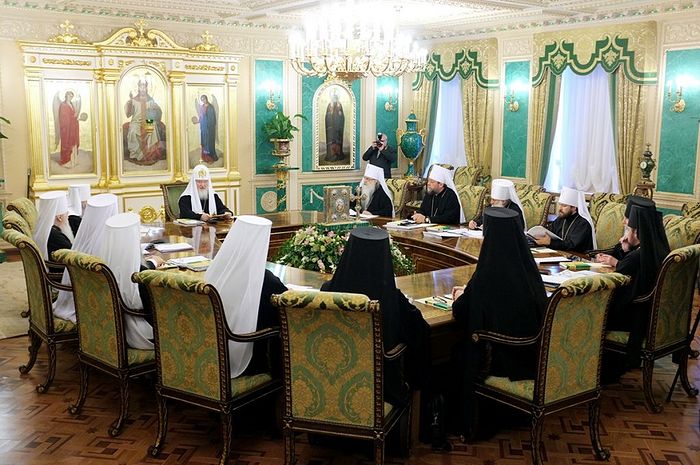
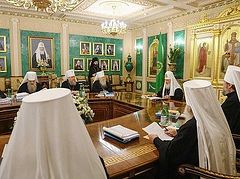
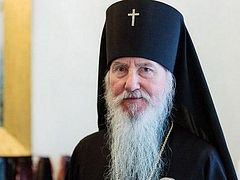
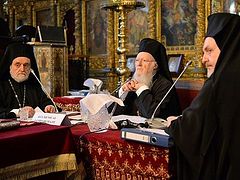
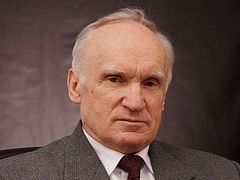
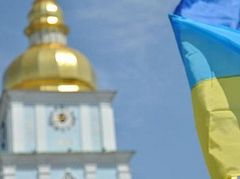
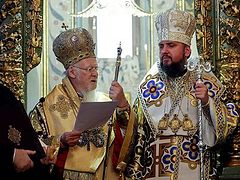
Unfortunately, it cannot be said that the Synod of Crete „was not evil”. Its documents are far worse than the new papacy of Constantinople. Ecumenical movement is a heretical one. It sees the Church embracing all the heretics together with the orthodox faithful.
Just to mention the phrase from the 19th paragraph, a quote from the Statement of Toronto: „The purpose of the World Council of Churches is... to bring Churches into living contact with each other and to promote the study and discussion of the issues of Church unity”. <b>It's about the dogma of the unity of a Church wider than the Orthodoxy.</b>